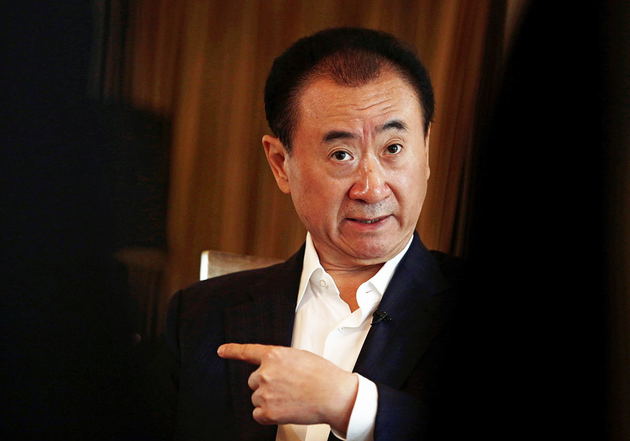
Photo/VCG
Jan.30 (NBD) -- Tencent Holdings Limited (Tencent), along with Suning Holdings Group (Suning), JD.com (JD) and Sunac China Holdings Group (Sunac), signed agreements with Dalian Wanda Commercial Properties Co. (Wanda Commercial) in Beijing Monday to pay about 34 billion yuan (5.4 billion U.S. dollars) for the latter's 14% stake owned by private investors who backed Wanda's delisting plan in 2016, the company said in a statement.
This is one of the world's largest single strategic investments between internet companies and brick-and-mortar commercial giants.
Cao Lei, director of the China E-commerce Research Center, told NBD the transaction signals Tencent-backed JD is ramping up efforts to take on Alibaba in the new retail sector. It also indicates Suning's push to remain independent.
Wanda represents the most valuable offline resource
If rushing to team up with supermarkets like Yonghui and Carrefour is the starting point of Tencent-backed retailers and Alibaba-backed ones to tap offline resources, then the Tencent-led consortium's acquisition of a stake in Wanda pushes their competition to climax. After all, Wanda represents the largest offline resource in China.
Statistics show that Wanda Commercial is a flagship company of Dalian Wanda Group and also the world's largest commercial property company. As of the end of 2017, Wanda Commercial reported revenue of 112.54 billion yuan (17.78 billion U.S. dollars), fulfilling 104.1 percent of its annual target and representing a year-on-year decrease of 21 percent. Rental income was 25.52 billion yuan (4.03 billion U.S. dollars), reaching 101.4 percent of the company's annual target and registering a year-on-year increase of 30.3 percent.
The company has had 31.51 million square meters of operating commercial property spaces till the end of last year. It has opened 235 Wanda Plazas in China, receiving 3.19 billion visitors annually. In addition, Wanda Group owns cultural tourism parks, hotels, cinemas, children's entertainment and other offline commercial businesses catering to various consumer needs.
But apparently, the joint investors have their own plan.
According to sources close to JD, the cooperation between Tencent, JD and Wanda Commercial will not be limited to investments, and they will also form China's largest alliance of "unbounded retail". The alliance will tap online resources owned by Tencent and JD and vast offline commercial assets owned by Wanda Commercial to offer new retail solutions to brand owners.
Cao Lei noted that the cooperation with Wanda might empower JD to catch up with its rival Alibaba.
While Suning said it will further increase its number of brick-and-mortar stores and improve its smart retail network. In turn, it will contribute rental income to properties of Wanda Commercial, which helps generate stable investment returns for Wanda. In addition, the two parties will work to make themselves more competitive by collaborating on financial services, logistics, procurement and membership data.
Tencent will conduct cooperation with internet technology companies of Wanda, and the latter will take the initiative in integrating online and offline services.
Wanda Commercial eyes listing on A-share market
The new investment will be crucial to Wanda Commercial's future plan.
As an important part of the Wanda business empire, Wanda Commercial announced privatization only 15 months after its IPO in Hong Kong. It was delisted in September 2016 with a market value of 237.68 billion HK dollars (30.41 billion U.S. dollars). Based on the Tencent-led investment this time, it is estimated that Wanda Commercial's value is at around 242.9 billion yuan (38.37 billion U.S. dollars).
According to Wanda Commercial's privatization project materials revealed previously, the company planned to go public on A-share market by the end of August 2018 with an estimated market value ranging from 270 billion yuan (42.65 billion U.S. dollars) to 688 billion yuan (108.67 billion U.S. dollars).
However, if it fails to do so, the company will repurchase all its shares and pay interest at a rate of 12 percent and 10 percent to overseas and domestic investors, respectively. In this case, Wanda Group has been ramping up its asset-light efforts since 2017. In addition, Wanda Group stated on its website that relevant parties will strive to take Wanda Commercial public as soon as possible.
It's noteworthy that after the introduction of the new investors, Wanda Commercial will be renamed Wanda Commercial Management Group, and aims to sell off its existing for-sale properties in the next one to two years. In the future, it will stop engaging in property development and will transform itself into a company solely focused on commercial management.
Yan Yuejin, director of E-house China R&D Institute, said the cooperation brings Tencent and JD closer, which will form a mighty force to reshape the commercial property landscape. Besides, it will boost the growth of the commercial property sector through the integration of traditional commercial properties and WeChat, online shopping as well as other online services.
Email: tanyuhan@nbd.com.cn


 川公网安备 51019002001991号
川公网安备 51019002001991号





